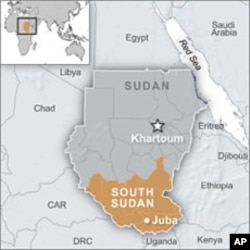An East African regional summit on Sudan has ended with no deal between north and south on key disputes threatening a referendum on southern independence. But the two sides did agree to keep talking as time for a deal runs short.
Five heads of state and one possible future head of state gathered at a posh hotel Tuesday to see what could be done to ensure the success of southern Sudan's January 9 independence referendum.
The vote is one of the final pieces of the 2005 Comprehensive Peace Agreement, which ended a 20-year civil war that killed an estimated two million people.
A summit communique urged north and south to "expeditiously resolve" remaining differences, including how to arrange a separate referendum on whether the oil-rich Abyei region goes north or south in the event of secession.
Briefing reporters after the meeting, Kenya's ambassador to Ethiopia and the African Union, Monica Juma, said a deal on Abyei appears close under the guidance of a high-level panel led by former South African president Thabo Mbeki.
"Both parties have provided assurances they will engage with this matter, difficult as it might be, and the general sense is there is a commitment to deal with the Abyei, and we believe it is going to be resolved, frankly," said Juma.
Diplomats say the real summit business was done on the sidelines. There, Sudan's President Omar al-Bashir and his first vice president, southern Sudanese leader Salva Kir, met with leaders, mediators and diplomats trying to help broker a deal.
Ethiopian Prime Minister Meles Zenawi emerged from an hourlong meeting with the two principals saying the difficult details of a deal on Abyei are likely to emerge from the Mbeki panel within days.
"We didn't get into the details of the discussion on Abyei," he said. "We expect the panel to lead the negotiations on Abyei sometime this week. What we tried to create was the right environment for the negotiations on Abyei to make progress, and I believe we made quite a lot of progress in creating the right environment."
In a separate interview with Reuters this week, Mr. Meles warned of what he called "ghastly consequences" for Africa if north and south Sudan return to war. He said all out war was "possible, but not inevitable."
"Yeah, Abyei is a tough nut to crack, but it's not as tough as the overall peace issue of the south," he said. "If we have succeeded in cracking that nut, there is no reason Abyei could not be cracked. But it takes some doing. It's not going to be easy. But I think there is a way around it."
African diplomats close to the negotiation process say the focus of the talks will shift back to Sudan within days, as the Mbeki panel unveils its Abyei proposal. Kenya's acting foreign minister, George Saitoti, said Monday there is still a window of about 10 days in which to reach a deal that would allow the referendum process to go ahead smoothly.
Kenya called this regional summit last month, but had to postpone it and move it out of Nairobi after the International Criminal Court requested that President Bashir be arrested. The ICC wants to try the Sudanese leader on charges of genocide and crimes against humanity in Darfur.
The venue was switched to Addis Ababa because Ethiopia is not a member of the ICC, and under no obligation to arrest Mr. Bashir.




